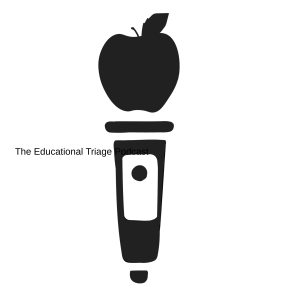
The Educational Triage Podcast
Education

To be nobody but yourself in a world which is doing its best, night and day, to make you everybody else, means to fight the hardest battle which any human being can fight; and never stop fighting. —E.E. Cummings
The first task is to mine your life story for common threads and major themes. The point is to identify your core, lifelong strengths, values, and passions—those pursuits that energize you and bring you joy. We use a variety of prompts but have found three to be most effective:
What did you especially love doing when you were a child before the world told you what you should or shouldn’t like or do?
Describe a moment and how it made you feel.
Tell us about two of your most challenging life experiences. How have they shaped you?
What do you enjoy doing in your life now that helps you sing your song?
Purpose - What fulfills us and transcends our own self-interest and to be oriented toward others. Also utilizes an intrinsic curiosity about the field.
For example, teaching can be fulfilling as we strive to work with all types of students, always working hard to ensure they all can comprehend and succeed. We also work hard to keep up with the literature, but we continue to explore new avenues and methods in classes, books, and other forms to satisfy that need to know. - Duckworth
According to Bloom - Purpose is developed through three stages - The Playing Stage - where things are tried out, practiced, dabbled in.
The second is where passion is discovered. Learning to develop and learn every single bit about it.
The third is where there is mastery - the skill becomes uniquely theirs through technique and expression, and they are able to express themselves thusly through it.
How does this apply to Bloom’s Taxonomy?
Questions:
- Define Purpose
- 3 Stages -
- Interest
- Practise
- Purpose
- How to incorporate Gardner/UDL into determining Interest (Play, discovery, investigating, etc)
- How to put into practice - what elements of school might the student use for those interests? How do they interplay?
- How does the purpose fulfill a need, help others?
- How/Where does Passion fit in?
- What about those who lose their passion early?
What’s the purpose of education in the 21st century?
link
By Valerie Strauss
February 12, 2015
Should young people become educated to get prepared to enter the workforce, or should the purpose of education be focused more on social, academic, cultural and intellectual development so that students can grow up to be engaged citizens?
Education should prepare young people for life, work and citizenship.
Knowledge of the natural and engineered environments and how people live in the world is critical to all three purposes of education. Critical thinking, creativity, interpersonal skills and a sense of social responsibility all influence success in life, work and citizenship.
CRITICAL THINKING
The Importance of Purpose in EducationStudents can discover a sense of purpose in their learning through questions that lead them to think about their interests.
By Matthew Howell
March 29, 2018
Certainly we have to fulfill mandates and meet educational standards, but so often our students leave our schools uncertain about who they are in the world and without a fully formed sense of purpose. Academics without purpose can be an exercise void of substance.
Learners who are authentically true to themselves will explore with abandon. The insights gained from reflective questions can be used by students and teachers to develop links between various subjects and spark interests in multiple curricular areas.
https://www.edutopia.org/article/importance-purpose-education
More Episodes
 2024-01-21
2024-01-21
 25
25
 2024-01-14
2024-01-14
 29
29
 2024-01-07
2024-01-07
 18
18
 2024-01-01
2024-01-01
 18
18
 2023-12-24
2023-12-24
 22
22
 2023-12-06
2023-12-06
 20
20
 2023-11-29
2023-11-29
 26
26
 2023-11-22
2023-11-22
 19
19
 2023-11-08
2023-11-08
 24
24
 2023-10-22
2023-10-22
 33
33
 2023-10-15
2023-10-15
 21
21
 2023-09-17
2023-09-17
 40
40
 2023-08-27
2023-08-27
 14
14
 2023-08-20
2023-08-20
 14
14
Create your
podcast in
minutes
- Full-featured podcast site
- Unlimited storage and bandwidth
- Comprehensive podcast stats
- Distribute to Apple Podcasts, Spotify, and more
- Make money with your podcast
It is Free
- Privacy Policy
- Cookie Policy
- Terms of Use
- Consent Preferences
- Copyright © 2015-2024 Podbean.com





